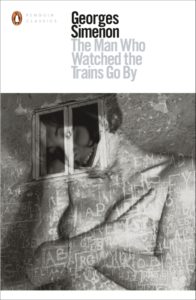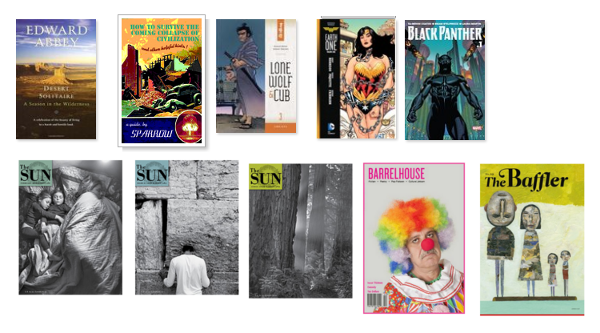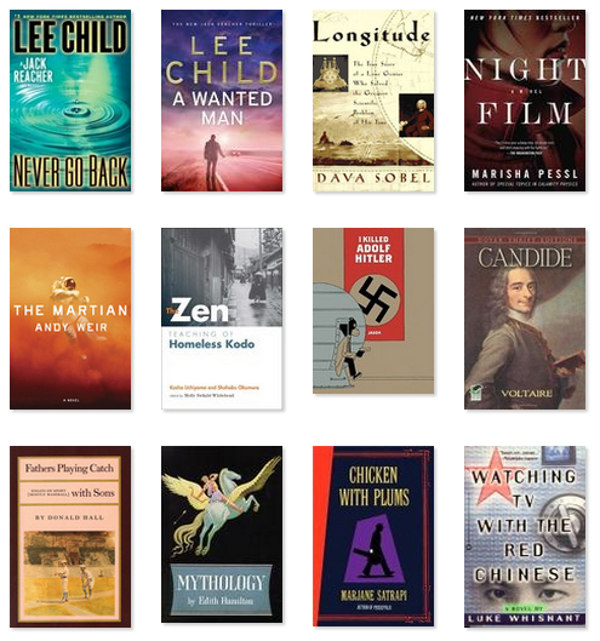Tolkein’s elves
children
in the churchyard
/ / /
17 August 2021
Greensboro VT
poet, interviewer, musician, traveler
thanks for not suing me
for stealing most of my personality
from your writing
I was young & impressionable &
I already liked radio comedy
so you can see how I might decide
that a bathrobe & a fish were good ideas
/ / /
24 April 2021
Musser Gap Trailhead
for Douglas Adams
warm tea inside me:
“Let’s all go to Narnia!”
(rain drums on the roof)
/ / /
24 December 2020
State College PA
 I came across this book at Bookmans in Tucson during our apartment-hunting trip a couple weeks ago. I’d never heard of the book or of Soshin O’Halloran, but I’m an admirer of books about the lives of Buddhist monastics and other practitioners. Pure Heart, Enlightened Mind is a collection of diary entries and letters published after O’Halloran’s death in a car accident at the age of 27. She was on a tour of Asia following three years as a Buddhist nun in Japan. It’s a lovely book; honest and forthright and brimming with zeal for her newfound Buddhist practice. At times the focus on kensho (englightenment) was a little much for me, but that’s because the flavor of Buddhism I practice doesn’t emphasize that aspect of Zen to the extent that Soshin’s did. It’s a worthwhile book, made bittersweet in the knowledge that she died just weeks after receiving transmission and being given permission to teach.
I came across this book at Bookmans in Tucson during our apartment-hunting trip a couple weeks ago. I’d never heard of the book or of Soshin O’Halloran, but I’m an admirer of books about the lives of Buddhist monastics and other practitioners. Pure Heart, Enlightened Mind is a collection of diary entries and letters published after O’Halloran’s death in a car accident at the age of 27. She was on a tour of Asia following three years as a Buddhist nun in Japan. It’s a lovely book; honest and forthright and brimming with zeal for her newfound Buddhist practice. At times the focus on kensho (englightenment) was a little much for me, but that’s because the flavor of Buddhism I practice doesn’t emphasize that aspect of Zen to the extent that Soshin’s did. It’s a worthwhile book, made bittersweet in the knowledge that she died just weeks after receiving transmission and being given permission to teach.
 This is easily one of the most powerful books I’ve ever read. Multiple times throughout this story of the climate crisis and the people fighting it, I had to set the book down and process what it made me feel. By the end it was as if a fire had been lit in my chest; a flame fueled by rage, a need for justice, a sense of crisis, and an overwhelming feeling of love. We need this book, but more importantly, we need to follow the lessons contained within it. I’ve been an organizer, often professionally, for my entire adult life. I’ve spent most of that time doing labor and anti-war organizing. In recent years I’ve been feeling a need to shift the focus of both my organizing and my broadcasting/podcasting work. What We’re Fighting For Now Is Each Other helped me sharpen that focus and prepare for the next phase of my life’s work. Highly, highly recommended. You can follow Wen Stephenson on Twitter.
This is easily one of the most powerful books I’ve ever read. Multiple times throughout this story of the climate crisis and the people fighting it, I had to set the book down and process what it made me feel. By the end it was as if a fire had been lit in my chest; a flame fueled by rage, a need for justice, a sense of crisis, and an overwhelming feeling of love. We need this book, but more importantly, we need to follow the lessons contained within it. I’ve been an organizer, often professionally, for my entire adult life. I’ve spent most of that time doing labor and anti-war organizing. In recent years I’ve been feeling a need to shift the focus of both my organizing and my broadcasting/podcasting work. What We’re Fighting For Now Is Each Other helped me sharpen that focus and prepare for the next phase of my life’s work. Highly, highly recommended. You can follow Wen Stephenson on Twitter.
[I need to thank climate justice writer Mary Annaïse Heglar for introducing me to this book via this essay. You can also follow Mary on Twitter.]
Leave a CommentMoby-Dick in the break room
because otherwise it’s a round Formica table
& the clicks and beeps from the alarm system
& the vending machines
a slowly shrinking horizon of possibility
& the monstrous white shape of the future
I read to remember myself
(a boss walks by, says, “Call me Ishmael”)
Melville was in his late 20s & early 30s
as he was writing his Great(est?) American Novel
luckily Alan Rickman was 42 when he played Hans Gruber
so there’s hope for me yet
///
Jason Crane
4 November 2019
State College PA
 I Can’t Believe It’s Not Buddha!: What Fake Buddha Quotes Can Teach Us About Buddhism by Bodhipaksa
I Can’t Believe It’s Not Buddha!: What Fake Buddha Quotes Can Teach Us About Buddhism by Bodhipaksa
My rating: 4 of 5 stars
A fun and fast read that is a real boon to anyone hoping to (a) figure out when things attributed to the Buddha are wrong, and (b) learn more about what the Buddha actually said (knowing, of course, that the first couple hundred years relied on oral transmission). Recommended.
Leave a Comment Uppity: My Untold Story About The Games People Play by Bill White
Uppity: My Untold Story About The Games People Play by Bill White
My rating: 4 of 5 stars
A real page turner that highlights some of the lesser-covered parts of the game of baseball. While the racism that has plagued the game is certainly no secret, White’s first-hand account as a player, broadcaster and president of the National League puts a personal, human face on the changes baseball has made, and the distance it has yet to travel. This book was written by someone who is very confident, and who certainly seems to feel he rarely if ever made a mistake, but at the same time he made it through a four-decade career in a tough business as a black man, so some protective ego isn’t surprising. All in all, well worth reading.
Leave a CommentThis poem was inspired by the book The Man Who Watched Trains Go By by Georges Simenon

Kees Popinga
to pretend with all your might
for fear that one slip
& you’ll find yourself carried
like so much dead wood on the waves
to stop pretending
yanking at the door of life
till it bursts open & the light
spills over your face
you make a pledge of fealty
death its only end
as if the human soul were
a bright unchanging diamond
rather than a sand castle
with the tide approaching
the little architect long since gone
leaving a half-buried plastic shovel
/ / /
Jason Crane
19 January 2018
State College, PA

I thoroughly enjoyed my April reading. I finally caught up on back issues of The Sun, Barrelhouse and The Baffler. I also finally read Edward Abbey’s brilliant Desert Solitaire. I’m a big fan of Sparrow, so I was excited to get to read his new book ahead of its release in May. I’m still reading the wonderful manga series Lone Wolf & Cub. And finally I read (and was underwhelmed by) a couple new comics. How about you?
Leave a Comment
March was nothing if not eclectic. I read a book about how the Pittsburgh Pirates used data analysis to turn around the team’s fortunes; a collection of samurai manga; and a book about Dogen’s Shobogenzo, one of the seminal texts of Zen Buddhist philosophy.
Leave a Comment
I started reading the Harry Potter series for the second time in January. Finished it in the middle of February. I also read a bunch of stuff about Unitarian Universalism because my partner and I are getting involved in our local UU fellowship. Scott Meyer’s The Authorities is a charming whodunnit, and A Tale Of The I Ching is a lyrical and fictional account of that famous book’s origins.
Leave a Comment
Not much. With the start of my new morning show job and the resultant early nights, coupled with my marathon to finish the 26 years of classic Doctor Who, my reading slowed waaaaaay down in August and September. I read and enjoyed a book about film editing (recommended by Mark Kermode); finished two books about various aspects of Doctor Who that I’d begun earlier in the year; read Neil Perryman’s charming book about watching classic Who with his wife; and read a wonderful biography of Syd Barrett, one of the founding members of Pink Floyd.
Leave a Comment
My reading slowed down in July, at least partly because I started working 60-hour weeks. I really enjoyed what I read, though. It was fun to read Dune for the second time, and I think I got even more out of it this time. My acquaintance Jessica Smith’s excellent book of poetry Life-list was both a challenge and a joy to read. As The World Burns is a funny and terrifying graphic novel. Thomas Merton’s selection of Gandhi’s writing is inspiring. And Letters From Yellowstone is a very engaging epistolary novel. I started, and subsequently gave up on, The Watchman’s Rattle. And I’m partway through about five other books.
One Comment
I read 12 books in June, tilted a bit too heavily toward dudes, apparently. The best thing I read was Zen Teachings Of Homeless Kodo, which I found very inspiring and would recommend to anyone interested in Buddhism generally, and Soto Zen in particular. I enjoyed everything I read this month except Night Film, which started strong and ended up very disappointing.
Leave a Comment